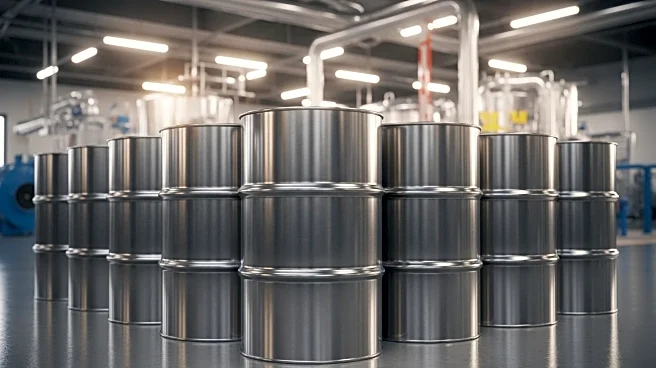What is the story about?
What's Happening?
Russia has announced an increase in its oil production, nearing the ceiling set by the OPEC+ agreement. Russian Deputy Prime Minister Alexander Novak stated that production is steadily growing, aligning with the country's commitment to fulfill its quota. In August, Russia's oil production was approximately 90,000 barrels per day (bpd) below its OPEC+ quota, averaging 9.173 million bpd compared to the 9.259 million bpd ceiling. For September, the quota was adjusted to 9.415 million bpd, including compensation for previous overproduction. Despite challenges, such as Ukrainian drone attacks on Russian refineries, Russia continues to manage its production levels. The country has also extended a ban on gasoline exports and introduced a ban on diesel exports by non-producers, responding to fuel shortages exacerbated by these attacks.
Why It's Important?
Russia's decision to boost oil production is significant for global oil markets, particularly as it aligns with OPEC+ strategies to stabilize oil prices. This move could impact global oil supply and pricing, influencing energy markets worldwide. The production increase comes amid geopolitical tensions, including the ongoing conflict with Ukraine, which has affected Russia's energy infrastructure. The bans on gasoline and diesel exports highlight the internal challenges Russia faces in maintaining domestic fuel supplies. These developments could affect international energy trade dynamics, with potential implications for countries reliant on Russian oil exports.
What's Next?
Looking ahead, Russia's oil production strategy will likely continue to adapt to both internal and external pressures. The ongoing conflict with Ukraine and its impact on energy infrastructure may necessitate further adjustments in production and export policies. Additionally, the global response to Russia's production increase, particularly from OPEC+ members and major oil-importing countries, will be crucial in shaping future market conditions. Monitoring these developments will be essential for stakeholders in the energy sector.
Beyond the Headlines
The geopolitical context of Russia's oil production strategy underscores the complex interplay between energy policy and international relations. The conflict with Ukraine not only affects Russia's domestic energy infrastructure but also has broader implications for global energy security. The strategic decisions made by Russia in this context could influence long-term shifts in energy alliances and market dynamics, highlighting the intricate link between energy resources and geopolitical power.

















